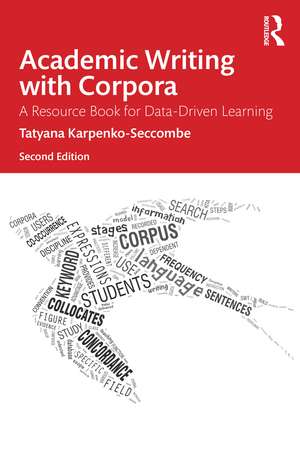Academic Writing with Corpora: A Resource Book for Data-Driven Learning
Autor Tatyana Karpenko-Seccombeen Limba Engleză Paperback – 20 dec 2024
Revised and updated throughout, this book:
• takes a highly practical approach, now with new tasks and the latest software features;
• fosters autonomous learning by demonstrating how to solve everyday difficulties in word choice and grammar;
• places a special emphasis on the use of corpora to explore rhetorical strategies;
• introduces the reader to five corpus tools (SkELL, Lextutor, COCA, MICUSP and AntConc);
• offers a new section on DIY corpora, including basic principles and a step-by-step guide to building a corpus, with an introduction to AntConc;
• now includes a ‘Further Reading’ section for each chapter.
This resource book is for teachers looking to introduce data-driven learning into the classroom without spending excessive time on researching corpora and preparing tasks. It is also for second-language academic writers – university students and researchers – who are motivated to improve their writing and to learn from proficient and expert writing in their area.
| Toate formatele și edițiile | Preț | Express |
|---|---|---|
| Paperback (2) | 246.49 lei 6-8 săpt. | +21.40 lei 7-13 zile |
| Taylor & Francis – 20 dec 2024 | 288.45 lei 3-5 săpt. | +21.40 lei 7-13 zile |
| Taylor & Francis – 22 sep 2020 | 246.49 lei 6-8 săpt. | |
| Hardback (2) | 765.84 lei 6-8 săpt. | |
| Taylor & Francis – 22 sep 2020 | 765.84 lei 6-8 săpt. | |
| Taylor & Francis – 20 dec 2024 | 936.16 lei 6-8 săpt. |
Preț: 288.45 lei
Nou
Puncte Express: 433
Preț estimativ în valută:
55.19€ • 57.63$ • 45.68£
55.19€ • 57.63$ • 45.68£
Carte disponibilă
Livrare economică 14-28 martie
Livrare express 28 februarie-06 martie pentru 31.39 lei
Preluare comenzi: 021 569.72.76
Specificații
ISBN-13: 9781032731865
ISBN-10: 1032731869
Pagini: 226
Ilustrații: 282
Dimensiuni: 156 x 234 x 18 mm
Greutate: 0.42 kg
Ediția:2
Editura: Taylor & Francis
Colecția Routledge
Locul publicării:Oxford, United Kingdom
ISBN-10: 1032731869
Pagini: 226
Ilustrații: 282
Dimensiuni: 156 x 234 x 18 mm
Greutate: 0.42 kg
Ediția:2
Editura: Taylor & Francis
Colecția Routledge
Locul publicării:Oxford, United Kingdom
Public țintă
Postgraduate and Undergraduate AdvancedCuprins
List of Figures
List of Tables
Acknowledgements
Introduction
Chapter 1 Introduction to corpus tools
Chapter 2 Introduction to AntConc. Building and using a do-it-yourself (DIY) corpus
Chapter 3 Observing and using language patterns
Chapter 4 Rhetorical and discourse features in general and subject-specific corpora
Chapter 5 Writing research papers with corpora
Answer key
Glossary of corpus terms
Index
List of Tables
Acknowledgements
Introduction
Chapter 1 Introduction to corpus tools
Chapter 2 Introduction to AntConc. Building and using a do-it-yourself (DIY) corpus
Chapter 3 Observing and using language patterns
Chapter 4 Rhetorical and discourse features in general and subject-specific corpora
Chapter 5 Writing research papers with corpora
Answer key
Glossary of corpus terms
Index
Notă biografică
Tatyana Karpenko-Seccombe is an independent scholar who for many years taught English for academic purposes at the University of Huddersfield, UK, using corpus methods.
Descriere
Academic Writing with Corpora offers an accessible guide to using corpora in academic writing successfully and productively. Addressing the challenges faced by EAP teachers when explaining to their students how to write 'naturally', this book places an emphasis on learning from expert and proficient writing.
Recenzii
'As developer of the Lextutor set of data-driven learning resources, I am often asked if there is a manual to aid in their discovery and use. I always reply that I have barely enough time for development, and someone else will have to write the manual. And so finally someone has done this, with regard to the skill of writing, and I hope others will do it for other skills. Tatyana Karpenko-Seccombe has done a great job of putting together possibly the only complete corpus-based writing course, composing and testing each chapter with actual learners along a two year trajectory. I have seen and commented on drafts along the way, and it has all come together splendidly.'
Tom Cobb, Université du Québec à Montréal, Canada
'This book offers an easy introduction to data-driven learning, using corpus resources that are free, easily accessible, and entirely authentic. Whether learning independently or in the classroom, academic writing students will find the activities relevant, engaging, memorable – and fun!'
Hilary Nesi, Professor in English Language at Coventry University, UK
'Researchers have enthused about the potential for using corpus resources and tools in the academic writing classroom but there has been a dearth of materials that help teachers and learners to realise that potential. At last, we have a book for practitioners and learners that makes corpus-assisted "learning to write" both accessible and achievable. This book will be invaluable to all English for Academic Purposes and first language writing teachers and learners that are interested in corpus-assisted learning approaches and techniques.'
Paul Thompson, University of Birmingham, UK
Tom Cobb, Université du Québec à Montréal, Canada
'This book offers an easy introduction to data-driven learning, using corpus resources that are free, easily accessible, and entirely authentic. Whether learning independently or in the classroom, academic writing students will find the activities relevant, engaging, memorable – and fun!'
Hilary Nesi, Professor in English Language at Coventry University, UK
'Researchers have enthused about the potential for using corpus resources and tools in the academic writing classroom but there has been a dearth of materials that help teachers and learners to realise that potential. At last, we have a book for practitioners and learners that makes corpus-assisted "learning to write" both accessible and achievable. This book will be invaluable to all English for Academic Purposes and first language writing teachers and learners that are interested in corpus-assisted learning approaches and techniques.'
Paul Thompson, University of Birmingham, UK
